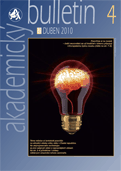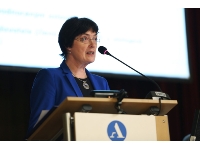The CAS has undergone a demanding evaluation of its research activities
The Czech Academy of Sciences concluded the evaluation of the research and professional activities of its 54 Institutes for the period 2010–2014. It was the most detailed evaluation ever not only of the Czech Academy of Sciences itself but in all of the Czech Republic. It was based on a method never before used in the Czech Republic, which lay in foreign experts within the individual research fields assessing the professional activities of the scientific teams in the international context. The works of Czech researchers was assessed by over 1,400 experts, who came from fifty countries, most often from Germany, the United States and France.
The basic aim of the whole exercise was to acquire detailed well-founded information not only
for the strategic management of the CAS as a whole but also for management of the individual
Institutes.
“
The conclusions of evaluations provide independent feedback on where the Institutes and their
teams stand in international comparison. A major difference compared to currently valid official
methodology is the thorough usage of informed peer review, which delivers a broader dimension and
provides information not only on the results already achieved, but also on the future prospects and
plans for the future,” stated the president of the Coordination Council of the Evaluation Prof.
Eva Zažímalová, member of the Academic Council of the CAS. The evaluation had two consecutive
phases; the two infrastructure Institutes had a separate evaluation. The basic unit of the
evaluation was the scientific team, of which there was a total of 377 from 52
Institutes.
The evaluators, in the vast majority foreign, assessed in the first phase the quality of a
total of 5,594 outputs (particularly articles in professional high-impact journals, monographs and
patents), which were submitted by the scientific teams. The outputs submitted represent
approximately one-quarter of the scientific production of the Institutes of the CAS during the
period 2010–2014. The restriction on the number of evaluated outputs, reflecting the number of
scientists and PhD students in the teams, was necessitated by the requirement to secure a
sufficient number of high-quality foreign evaluators so that each output could be assessed by at
least two evaluators.
In the first phase, 16.5 % of the assessed outputs were classified as “world-leading”, hence
at the very peak of the world level and almost 42 % of the outputs were classified as “
internationally excellent”. Roughly 35 percent of the outputs were classified as being on standard
international level, six percent as work on the national level and 0.4 % of the outputs were
assigned to the last level. This last category did not automatically mean the worst level – in many
cases the evaluators assigned there outputs they did not consider to be scientific in the narrowest
meaning of the word. The President of the Czech Academy of Sciences Prof. Jiří Drahoš considers it
to be a very good result. “Sixteen percent of peak outputs is not a small percentage at all
. They are peaks comparable with the best world category.
If these best scientists worked in the USA, at Cambridge or Oxford, they might be much closer to
a Nobel Prize than from the Czech Republic,” President of the CAS Prof. Drahoš assesses the
results.
In the second phase, 13 discipline Commissions evaluated the Institutes of the CAS and their
teams from six points of view: the quality of outputs and outcomes, their social impact, the
position in the international and national context, the engagement of students in research, the
sustainability and prospects, and the plans for research activities for the next period. The result
of this phase, which included on-site visits of the Commissions at all evaluated Institutes and
discussion with the heads of the relevant scientific teams, are the final reports. In them, the
Commissions in written comments assessed in detail the teams from all the mentioned points of view.
The final reports contain also the statements of the directors of the assessed Institutes on the
result of the evaluation of their Institutes and teams.
The evaluation of the two infrastructure Institutes – the Centre for
Administration and Operations of the CAS and the Library of the CAS – was conducted according to a
specially set methodology. The evaluating Commission with international representation assessed the
Institutes from four points of view as a whole and five organizational units in each of them. From
the five-level scale, the Commissions used only the first two levels in their final reports, i.e.
outstanding or very good.








